#edmund warwick
Text
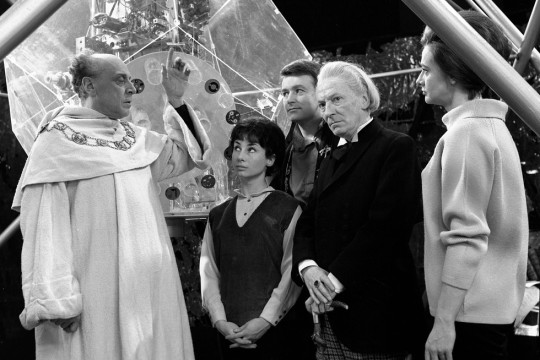
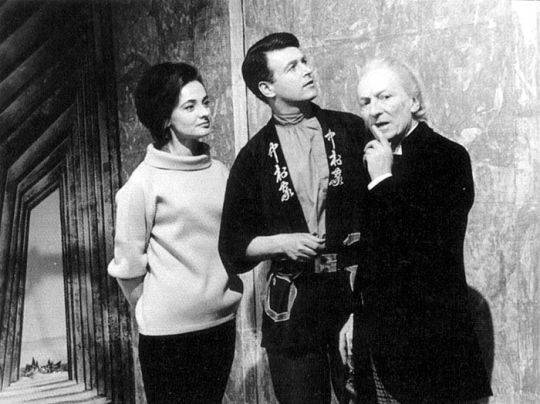
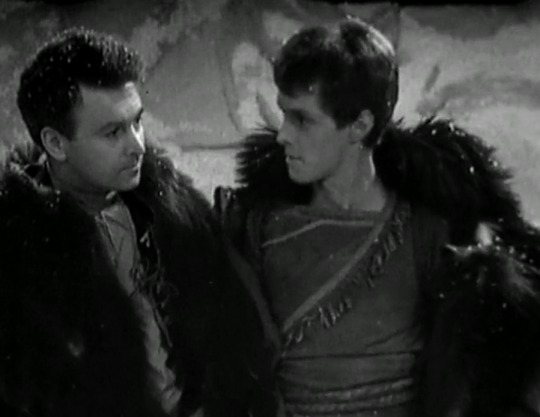
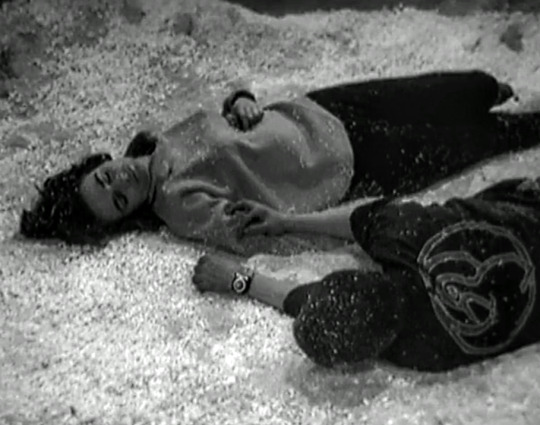
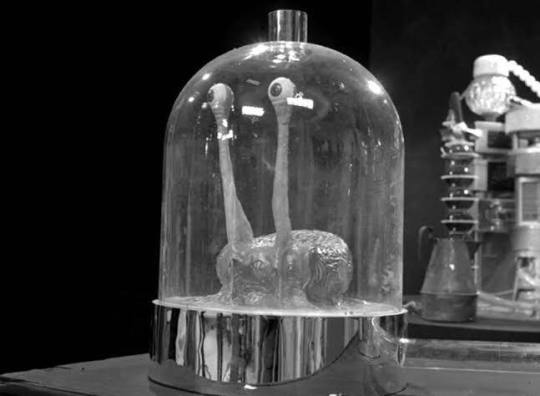

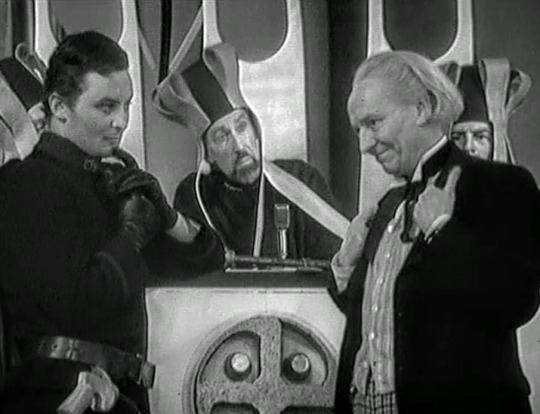

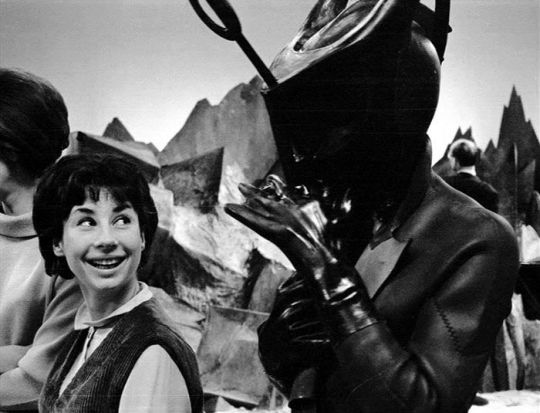
Doctor Who: The Keys of Marinus (1.5, BBC, 1964)
"I want to speak of your father. You know, he was a very wise and brilliant man and I know how you felt when you learned of his death."
"And his life's work destroyed."
"Oh, no, no, no, no, I wouldn't say that. His work will go on, only not quite in the same way. But I don't believe that man was made to be controlled by machines. Machines can make laws, but they cannot preserve justice; only human beings can do that."
#doctor who#classic doctor who#the keys of marinus#1964#bbc#terry nation#john gorrie#william hartnell#jacqueline hill#william russell#carole ann ford#george coulouris#robin phillips#katherine schofield#donald pickering#fiona walker#henley thomas#stephen dartnell#francis de wolff#edmund warwick#raf de la torre#another old favourite from childhood. i distinctly remember first watching this with my bro as a nipper; he hated it (boring and naff) but#i was entranced; something about all those mini adventures strung together‚ the different locations and traps and menaces. it.. doesn't#entirely hold up to my childhood memories (tho I'm surprised to read so much antipathy towards the serial) but considering the complete#lack of money available (post Marco Polo extravagance) and the ambitious multiple sets and costume changes‚ i think the team did fairly#well. surprised to find that‚ despite Coulouris' Arbitan being seared into my mind as a main player of this story‚ he only actually appears#in part 1. the script isn't Nation at his best (but as ever i love his imagination in alien world building‚ with acid seas and glass#beaches) and the plot does Susan dirty (reduced to quivering child for much of the story‚ where's the alien brilliance of the first story?)#but Barbara gets a good showing here‚ particularly in part 2 (the brains with eyes! they shouldn't be adorable but they are). the trial ep#is a little clunkier‚ slowing down the pace as the story starts to wrap up‚ but I'm still quite fond of this silly story
42 notes
·
View notes
Text

Happiness=3 books of illustration masters arriving at the same time
7 notes
·
View notes
Text
Sir John Wenlock's Castle of Someries
Sir John Wenlock was a known side-swapper during the Wars of the Roses. Although not as infamous as Thomas Stanley, Wenlock also frequently changed allegiances, starting out as a Lancastrian, then becoming a Yorkist, then a Warwick supporter and then back to being a Lancastrian again. He fought for the House of Lancaster at Tewkesbury and was killed in the field, some say by his own commander,…
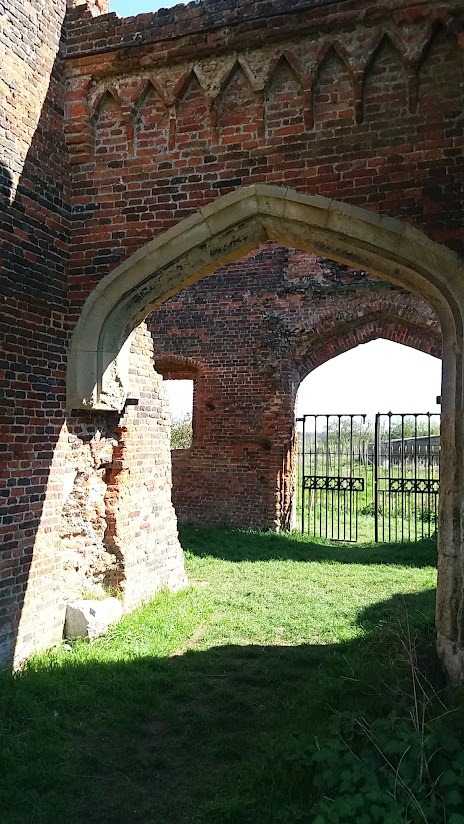
View On WordPress
#Edmund Duke of Somerset#Gatehouses#Luton#Luton Airport#Richard of Warwick#ruins#Sir John Wenlock#Someries Castle#Tewkesbury#treachery#Wars of the Roses
0 notes
Text
Speaking to the Observer, Prof John Edmunds of the London School of Hygiene and Tropical Medicine, who was a member of the Sage committee of advisers to ministers and who has submitted written evidence to the inquiry, said the controversial Eat Out to Help Out scheme – which gave people discounts for eating in restaurants and pubs – was never discussed with scientists.
“If we had [been consulted], I would have been clear what I thought about it,” said Edmunds. “As far as I am concerned, it was a spectacularly stupid idea and an obscene way to spend public money.”
Eat Out to Help Out was launched in August 2020. It allowed diners to claim 50% off more than 160m meals at a cost to the Treasury of about £850m. In the process, it also drove new Covid-19 infections up by between 8 and 17%, according to a study carried out by Thiemo Fetzer, an economist at the University of Warwick, a few weeks later.
[...]
Edmunds said the Sage scientists had no real role in shaping policies across government. “We were asked questions and gave scientific answers but we didn’t know what strategy was being discussed by the government. It was written by them and we saw it the same day that the press saw it.
“They never said: ‘Here’s the strategy, what do you think of it?’ That’s not how it worked and that is why it’s always been so misleading for the government to pretend that it was following science. That’s just nonsense.”
186 notes
·
View notes
Note
What is the relationship between Elizabeth of York and her father's relatives? She seems to have a good relationship with her mother's relatives
Hello! It's difficult to say because there's little evidence of her relationship with them. Her aunt Margaret left for Burgundy when Elizabeth was only two years old so I doubt any relationship was ever established between them. Elizabeth's other aunt, Anne of York, died when Elizabeth was still young. We don't have evidence of Elizabeth's relationship with the aunt with whom she shared a name either (Elizabeth of York Duchess of Suffolk), though Elizabeth did maintain friendly relations with her daughter, Anne de la Pole the Abbess of Syon — a monastery Elizabeth's father Edward had particularly supported. Elizabeth also maintained cordial relations with Edmund de la Pole, Anne's brother (another paternal cousin), but the extent of her patronage/support of him is much less clear. It's intriguing to wonder what Elizabeth thought of their brother John, though, considering she had been placed under house arrest in the North under his supervision during Richard III's reign (he was, in a way, her gaoler). John would later betray the confidence Elizabeth's husband had placed in him, so it's likely she didn't hold him in high regard by the time he died at Stokefield.
When it comes to the children of her uncle George of Clarence, Elizabeth probably had a friendly relationship with her cousin Margaret. Margaret played a visible role in Arthur's christening and was present at the exclusive box where Henry VII and his mother watched Elizabeth's coronation. Margaret was, of course, Margaret Beaufort's ward and she probably only left the king's mother's household when she married the king's cousin, Sir Richard Pole. Sir Richard was made Prince Arthur's chamberlain and they lived far from court, so it's unlikely Elizabeth and her cousin Margaret ever had much opportunity for a closer relationship. In regards to Margaret's brother Edward of Warwick, we'll never know Elizabeth's feelings for him, but she probably valued her sons and husband more than the cousin she only knew as a child. Elizabeth certainly wasn't opposed to receiving the revenues of some of his Warwick estates during his minority, either.
The most intriguing relationship would be the one Elizabeth had with her paternal grandmother Cecily Neville. They don't seem to have been close from what evidence we have, though both of them were godmothers to Bridget, Elizabeth's youngest sister, and Cecily bequeathed her some important jewels in her last will, which she didn't do to any other grandchild. It's difficult to say if it was simply a matter related to status, though. Cecily certainly was proud enough to call herself 'the queen's grandmother' during Henry VII's reign. Henry, in turn, rewarded Cecily's musicians (which indicates she was present at the court's festivities on the occasion) and safeguarded her income/lands in his first parliament, so that might be why Cecily left him some money and a golden cup in her last will too. It's possible Henry's good treatment of Cecily might have been for Elizabeth's sake or in response to her request but generally, Henry doesn't seem to have been vengeful or harsh when it came to dealing with the Yorkist family (challengers to his rule aside).
Going back to Elizabeth of York and her paternal relatives, she certainly seems to have been friends with her half-brother Arthur Plantagenet, an illegitimate son of Edward IV. She employed him in her household and, after her death, instead of sending him away Henry VII employed him in their son's household, perhaps in respect for the affection Elizabeth felt for him. That might be one of the clearest examples of her affection for her father's relatives, but Elizabeth seems to have been close to all of her siblings in general, so it certainly fits what we know about her (Polydore Vergil said she held extraordinary affection/love for her siblings).
These are all the relatives I can think about now but I'll go back to this question if I remember anyone else 🌹x
26 notes
·
View notes
Text
Hearts Divided: Chapter Eight - Secrets Unraveled

Chapter Description: After one last secret meeting with Benedict, Y/n learns of the information he discovered about Edmund's discovery. With one last attempt at saving their future, Y/n finally discovers their father's long hidden secret.
Chapter Seven: 'Fate Unknown'
Chapter Nine (Final): Coming Soon
Pairing: Benedict Bridgerton x GN!Reader
Warnings: Nothing really, except one kiss
Words: 2.3k
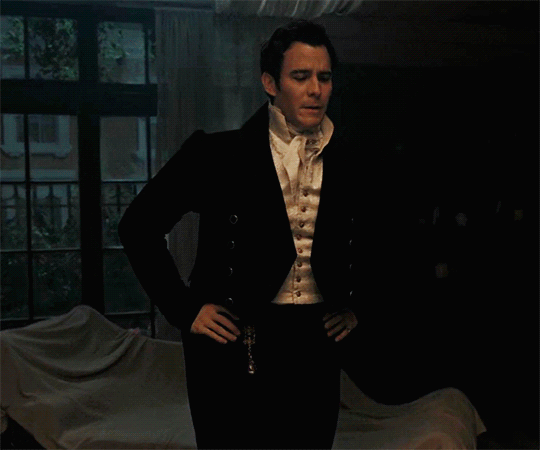

-
With your note clenched tightly in his hand, Benedict marched down the corridors of his family's home. His chest burned with a determination he had never felt before. Bursting into Anthony's office, he stared his brother down.
Anthony jumped slightly at the sudden intrusion. His annoyance died when he saw the look on Benedict's face. "What is it brother?" He asked with concern.
"I need your help." Benedict began as he approached "Where are father's old journals?"
Anthony frowned, confused. "Uhm, I'm not sure, why do you need them?"
Benedict set your letter on the table "Y/n. Sir L/n, let it slip that father found something out about Sir L/n, which lead to their fallout. You know father, he wrote everything down. Perhaps it is in one of his journals."
Anthony let out a sigh "You know mother packed them away in her grief."
"But do you know where they are?"
"He does not."
Benedict turned at the sound of his mothers voice. She stared at him from the doorway with a pensive look.
"I could not bring myself to read Edmund's journals after he died. But if there is something in those journals that could save Y/n from this fate, I will."
Benedict marched up to her, placing his hands on hers "Thank you mother."
She smiled softly. "Of course darling. And, there is something else you must know."
"What is it?"
"I just heard word, that the L/n's are to be at the ball tonight." Benedict's chest tightened. "Y/n is to be there, I believe with Sir Colton."
Benedict shook his head with a sigh "We're running out of time."
She gripped his hand "Then we must hurry. Come." Turning to leave, Benedict spared a look at Anthony before he followed her, his chest tight with anxiety and hope.
--- --- ---
"I didn't realize there were so many." Benedict groaned as he flipped through the seventh journal.
Violet sighed "Yes, your father certainly did enjoy the written word."
Benedict looked at the nearby clock, the ball was growing closer and closer, and they had yet to find anything. Just as he had begun to grow desperate, Violet stood up.
"Here, here! This was from the year the L/n's left London."
Benedict, quickly joining her, flipped through the journal, his eyes scanning every date.
"There, this was written three days before Sir L/N and your fathers fight." Violet said as she pointed at a single entry.
'I discovered something rather alarming. I must discuss this with Charles. I cannot believe he would risk his reputation and family on this. I must believe this information is wrong.'
"What does this say?" Benedict asked as he ran his finger over a marked out passage, unable to make it out.
Violet brought the journal to the light as she squinted, trying desperately to read it "War- Warwick- something."
"Warwickshire?" Benedict asked.
"Perhaps. There's something else, a name I think. 'Barlowe'." Violet looked up as she thought for a moment. "There was a family, rather wealthy and high up in the Queen's favor by the name of Barlowe I believe. They left London a few years after the L/n's"
Benedict met her eyes as he nodded his head "It must have something to do with them then. Maybe he scammed them out of money or something?"
Violet let out a soft breath "Maybe. I wish I could reach the rest, but it's illegible."
As the clock chimed, Benedict frowned "I hope it's enough, maybe Y/n will be able to find out more. I must find a way to get Y/n alone tonight."
Violet nodded as she clutched the journal tightly "We'll find a way darling. But you must be careful, you could very easily make the situation worse, you must not get caught."

Your heart was hammering violently in your chest as your carriage stopped at the entrance. You knew your father was using this ball as an occasion for you and Sir Colton to be seen in public together. But you had every intention of finding a way to speak with Benedict.
It would be very hard for you to get a moment alone, especially after the warnings your father gave you to stay away from the Bridgerton's. His eyes would be on you most, if not all of the night. But you were determined.
As Sir Colton escorted you into the ball, you kept your face blank having no intention of showing joy in Sir Colton's company. The whispers started soon after your arrival, much to your fathers annoyance. No one believed your courting with Sir Colton was your choice, and you wanted it to stay that way.
Your eyes scanned the room, pausing on Eloise, and then Collin, and finally Anthony and Benedict. When yours and Benedict's eyes locked, you felt your chest swell with various emotion.
Previously, you had been convinced that you might never set eyes on Benedict again. Now, as you did, he was so close, yet so far away. With your arm linked through that of another's to whom you were promised against our own will, you felt as though you could break down into tears.
His eyes were filled with various emotion, jealousy, anger, longing, love, and determination that had been sparked in both of you.
The slight nod of is head told you he knew something. Perhaps something that could unravel the mystery of your families all-out, something that could save you.
Forcing yourself to look away from him before your father noticed, you swallowed the lump in your throat. Your mind was racing with excuses you could use to slip away for a moment. Your moment did not come until an hour into the ball, when both your father and Sir Colton were cornered by various associates. Once they started to animatedly talk about business, you knew you had found your moment.
Telling your mother you needed to use the rest-room, you slipped away. Your eyes locked onto Benedict's, and you saw the realization in his eyes as you exited the ballroom.
Patting his brother's arm, Anthony nodded, and watched your father and Sir Colton closely as Benedict slipped out, smiling and nodding to those around him, as to not seem suspicious.
Slipping into a dark room down the hall, you listened closely at the door for Benedict's footsteps.
As they grew closer, you softly knocked on the door to alert him of your location. As the door opened and he slipped in, there was only a brief moment when your eyes met before he pulled you into his arms.
Pulling away from you, he placed his hands on either side of your face before he pulled you into a deep and meaningful kiss. Your chest filled with joy and grief as you feared this would be that last time you shared any moment of intimacy with Benedict.
"God I missed you." He whispered as you pull away from each other.
You gently caressed his face and smiled, a sad smile that told him you felt the same.
Hearing the sound of excited conversation nearby, Benedict was reminded of your situation.
Reaching down, he grabbed your hand and lead you further into the room "I discovered something in my fathers old journals in regards to what happened with your father."
You felt your heat jolt at this "What was it?"
You watched as he pulled a journal from his breast-coat pocket. Flipping through the pages, he handed it to you. Reading over the passage and looking closely at the crossed out words you frowned.
"We believe it says Warwickshire and Barlowe. Mother says there was a family called Barlowe in London at the time."
"Yes, I remember that name. My father would often leave on business trips with a Barlowe."
"Do you think you could find out more?"
You shook your head with uncertainty "My father has journals as well, but they are no longer here in London. I do not know if there would be anything in his current journals in his study here, but if there is even a slight chance there is something, I must look for it."
"What if he catches you?"
You let out a soft and scornful laugh "What else could he do to me?"
Benedict closed his eyes with a sigh as he gently held your hand close to his chest. "I meant what I said in my letter. If we cannot find a way to break this agreement, I will run away with you if you want. Anywhere you want to go."
You smiled sadly at him, reaching up you cupped his face "Do you think I would let you do that to yourself and your family?"
He smiled sadly and shook his head, opening his mouth, he was unable to speak as you heard your fathers voice calling your name in the hall. You and Benedict stared at each other in alarm.
Giving him back the journal and pushing him towards a closet, you ushered him to hide as you ran to the window.
A moment later the door opened and your father entered. His eyes scanned the room before they landed on you as you stood at the window, face blank of emotion.
"I'm sorry father, I just wished to have a moment alone." You said casually as you walked through the room towards him.
Your father eyed you suspiciously before he took your elbow in his hand and lead you from the room "Sir Colton wishes to dance."
You felt your stomach twist as you left the room, you refused to spare a single glance back towards where Benedict hid, as your heart ached in your chest.

You listened closely as the house remained quiet as you made your way towards your fathers study.
You had managed to convince your father to let you leave early, when he and Sir Colton joined the other male company for drinks and card games for the rest of the night.
You hated that you did not get to say goodbye to Benedict. Only able to spare a parting look to him and his family as you left the ball.
But you needed this chance to search for something, anything on the Barlowe family of what happened in Warwickshire. You would look for his accounting books, through his journals and letters.
Closing his study door behind you, you quickly got to work. You searched through the drawers, flipped through his journals, his accounting books, but found nothing.
After what felt like forever, you sat in his chair, placing your head in your hands, as your eyes grew wet with tears. Doubt and disappointment reigned over you.
Jumping at the sound of your fathers study door opening, you looked up with alarm. Seeing your mother standing in the doorway, you froze, remaining silent.
After a moment she spoke "I thought it odd you wished to leave so early without a chance to see Benedict. I decided to return early as well to check on you." Her voice was calm, yet held something uncertain behind it.
You cleared your throat lightly "I no longer wanted to be flounced around with Sir Colton like a prize won at auction."
You mother adjusted herself in discomfort before she closed the door behind her. "What are you doing in here?"
Remaining silent for a moment, you felt your chest tightening with anxiety. If anyone could help you find anything on the Barlowe's, it would be her. But you feared she would betray you to your father again.
Finally, after a moment, you spoke slowly uncertain "I found something out. About what may have happened between father and Sir Bridgerton. I wanted to see if I could find anything in here to confirm it."
She watched you for a moment before stepping further in. "What was it you discovered?" You could hear the restraint in her voice, she too had been wanting to know what happened for years.
"It had to do with the Barlowe family, and something about Warwickshire."
You saw your mother's eyes widen slightly at the mention of the Barlow name. Turning away from you she stared down at her feet as she paced a little.
"Mother?" You asked after a moment.
Looking back at you she let out a soft sigh. "I remember the Barlowe's. William Barlowe was a business partner of your fathers. And his wife, Marianne, beautiful woman. Her and your father had been friends since they were children."
You frowned at the tone of her voice. Watching as your mother let out a frustrated sigh before she made her way towards the desk.
"All this time I wondered if it was true."
"If what was true?" You asked as anticipation grew.
Your mother reached into a drawer, before fiddling around. After a moment she pulled out a single key that had been taped to the roof of the drawer.
"But I refused to acknowledge it, for fear of ruining our family." Watching as she walked over to your fathers safe, you rose, watching her unlock it.
As she rifled through it, she pulled out a bundle of letters. She met your eyes as her voice grew softer. "You do not deserve the fate your father is trying to force on you."
You locked eyes with her for a moment, and for the first time in a long time, you saw a familiar motherly gaze staring back at you.
As she pulled out a letter and began to open it, you moved to her side and read over her shoulders.
Reading through the letter, and then another, and another, much became clear quickly.
Surprise, alarm, and hope rose through you as you finally understood what Sir Bridgerton had learned all those years ago. You finally understood what it was your father was so afraid of the world finding out.
xx End xx
Cliff-hanger!~ The final chapter will reveal all, and will hopefully be out soon!
General Taglist: @criminaly-supernatural, @caswinchester2000, @imaginesfire, @onuen, @witchygagirl, @alexxavicry
Bridgerton/Benedict Taglist: @magravenwrites, @fandomfoodiedancer, @girl-next-door-writes, @savagejane1, @flourishandblotts-inc, @nikirennie87, @theonewithallthemilkshakes, @rach2602, @marrianena, @ambitionspassionscoffee, @tinymushrooms, @persephonesportal, @winnifredburkleismyhero, @soultrysworld, @creativitybeware, @j18284
Story Taglist: @belloangelus, @mysticallis, @olixerwxxd, @wotcherboo, @ambitionspassionscoffee
#Benedict Bridgerton#Bridgerton#Hearts Divided#Chapter Eight#Benedict Bridgerton story#bridgerton story#benedict bridgerton x reader#benedict bridgerton x gn!reader#benedict bridgerton imagine#benedict bridgerton/reader#bridgerton oneshot#bridgerton x reader#bridgerton fic#fic#story#bridgerton reader insert#benedict bridgerton x y/n
89 notes
·
View notes
Text
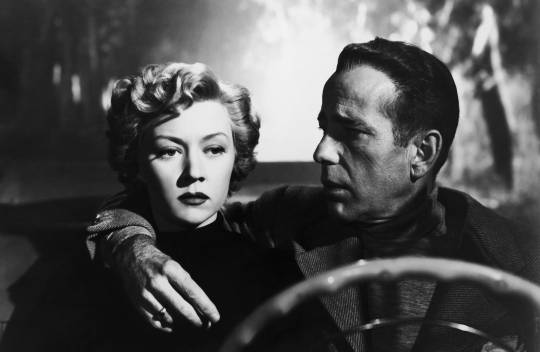
Gloria Grahame and Humphrey Bogart in In a Lonely Place (Nicholas Ray, 1950)
Cast: Humphrey Bogart, Gloria Grahame, Frank Lovejoy, Carl Benton Reid, Art Smith, Jeff Donnell, Martha Stewart, Robert Warwick, Morris Ankrum, William Ching, Steven Geray, Hadda Brooks. Screenplay: Andrew Solt, Edmund H. North, based on a story by Dorothy B. Hughes. Cinematography: Burnett Guffey. Art direction: Robert Peterson. Film editing: Viola Lawrence. Music: George Antheil.
The "lonely place" is Hollywood, where Dixon Steele (Humphrey Bogart) is a screenwriter with a barely held-in-check violent streak. This celebrated movie contains one of Bogart's best performances, though it looks and feels like the low-budget production it was. Bogart's own company, Santana, produced it for release through Columbia, instead of Bogart's employer, Warner Bros., which may explain why, apart from Bogart and Gloria Grahame, the supporting cast is so unfamiliar: The best-known face among them is Frank Lovejoy, who plays Bogart's old army buddy, now a police detective. In a Lonely Place seems to be set in a different Hollywood from the one seen in the year's other great noir melodrama, Billy Wilder's Sunset Blvd. There are no movie star cameos and glitzy settings in the Bogart film. What this one has going for it, however, is a haunting, off-beat quality, along with some surprising heat generated between Bogart and Grahame, who plays Laurel Gray, a would-be movie actress with an intriguing, only partly glimpsed past that hints at a sapphic subtext. She has, for example, a rather bullying masseuse (Ruth Gillette), who seems to be a figure out of this past. In fact, the whole film is made up of enigmatic figures, including Steele's closest friends, his agent, Mel Lippman (Art Smith), and an aging alcoholic actor, Charlie Waterman (Robert Warwick). Both of them stick with Steele despite his tendency to fly off the handle: He insults and at one point even slugs the agent, while at another he defends the actor with his fists against an insult. Though the central plot has to do with Steele's being suspected of murdering a hat-check girl (Martha Stewart) he brought to his apartment to tell him the plot of a novel he's supposed to adapt, the film is less a murder mystery than a study of a damaged man and his inability to overcome whatever made him that way. And despite the usual tendency of Hollywood films to end with a resolution by tying up loose ends, In a Lonely Place leaves its characters as tensely enigmatic as they were at the start -- perhaps even more so.
5 notes
·
View notes
Note
Could you please tell me what kind of personality Richard III had?
I haven't written anything about Richard III - or the English history - in years, but I assume you've seen some of my older posts from the time when I was reading books and other sources on the English history and participating in discussions among the history fandom on Tumblr. So this is a nice blast from the past ;)
Of course, I can't tell you with certainty what Richard's personality was like, so this is speculation, but I think we can get a reasonably good general idea of it based on historical sources available.
First off, if you haven't read any of the articles that came out a few years ago, after his remains were found, about psychologists analysing Richard's personality, you can read it here, for instance.
I generally agree with this. Psychologist Mark Lansdale, PhD, describes him as "a relatively normal guy dealing with a very difficult set of circumstances" (mind you, relatively normal here specifrically means a relatively normal medieval English nobleman) and states that Richard didn't show signs of what is now popularly known as "sociopathy" (in other words, the image of him people get from Shakespeare's play - even though Shakespeare was never even remotely trying to be historically accurate, or Thomas More's book about him, which was an unpublished work that was never intended as a serious historical work and reads more like satire) but shows signs of "intolerance of uncertainty" as a symptom of anxiety disorder.
In other words, having experiences severe trauma as a child and in his youth as a result of a civil war and his family being torn apart by it, Richard liked stability, and could show authoritarian tendencies at times when a civil war was threatening to break out again (aka in the turmoil after his brother Edward IV's death). A reminder that Richard was only 2 years old when the tensions in the English court broke into armed conflict, and his father Richard, Duke of York, fought his first battle against his enemies at court such as Edward Beaufort, Duke of Somerset. When Richard was 6 and a half years old, he got to experience what must have been an incredibly traumatic event as the Lancastrian army brutally sacked the town of Ludlow, reportedly including the York family household, and Richard he was taken prisoner with his mother Cecily and his older siblings Margaret and George. He also may have witnessed the brutality against other people who were not protected by station as his family was. Meanwhile his father and two eldest brothers had to flee to Ireland. Then, after a brief time when it seemed the tide had turned in his family's favor, his father was killed, along with his second son Edmund, at the battle of Wakefield, probably after being betrayed by one of his allies - and 7-year old Richard, together with his 10-year old brother George, were sent abroad by their mother for their own safety. A few months later, the tide would decisively turn again thanks to his oldest brother Edward, who crowned himself Edward IV and won a decisive battle at Towton, beating the Lancastrian forces, taking King Henry VI prisoner (former king, at that point) and forcing Queen Margaret to flee to France with the crown prince Edward.
I think this is what also shaped Richard's relationship with Edward. While George and Richard did not always get along (the struggle around their respective wives' Neville inheritance), I imagine they were probably still close, as they were close in age and grew up together, and had a classic sibling rivalry. On the other hand, Edward who was 12 years old than Richard - must have been a looming, idealized big brother figure, great warrior and protector and savior of their family, even more prominent since Richard lost his father so early. George, however, did not have a good relationship with Edward and would later rebel against him, together with his father-in-law/first cousin Warwick "the Kingmaker", but Richard always remained loyal to Edward and, as a teenager, became his right hand.
By all accounts, Richard himself was a powerful and brave knight/warrior, and a capable and respected ruler/administrator during his time in the North, where he remained very popular even after his death (there are accounts of bar fights breaking in at the time of Henry VII's rule in the North where some people did not take well to Richard's reputation being smeared). The former is more interesting when we take into account his physical characteristics.
There has been a lot of misinformation about Richard's disability over the ages and it oddly still continues. Today, we know that he had scoliosis - a spinal deformity where one of shoulders would be higher than the other (which is a very different thing from a hunchback), which started when he was a teenager. The extent to which he would've been affected by that has been debated. According to what the experts said after examining his remains, it probably did not cause him much pain, and it would not have stopped him from being a great knight that he was reputed to be (it has been demonstrated that people with similar degree and type of scoliosis, and even with much less training and fitness than Richard had, could perform all the tasks such as horse riding, wielding weapons etc.). However, it did make him shorter than he would've otherwise been, and together with his slender frame and below average height (for a medieval nobleman, that is - as noblemen were taller on average than the rest of the population) it means he had no work and train harder than someone with such physical predispositions as Edward IV (who was very tall - around 194 cm aka 6'3-6;4" and big and strong and athletic in his youth, before getting overweight).
Richard's scoliosis would not have been visible as long as he had his clothes on - which is why there are no reports of it by anyone, including foreigners who had met him, during his lifetime. It only became public knowledge after his death, when his dead body was stripped naked and paraded through the streets of Leicester (flung over a horse, in a positition that made the spine curvature as visible as possible) and displayed in the town. People who met him during his life mostly described him as not tall* but slender, fit, with long fingers and handsome. (*Some remarked that he was on the shorter side, but a German knight who met him described him as quite taller than himself; most likely, Richard was shorter than average for a medieval nobleman, but still not as short as some others.) However, knowing the medieval supersitions about physical deformity as a punishment from God and possible sign of evil (which was exploited by the Tudor propaganda as much as possible after his death), his scoliosis would've been a carefully guarded secret. "Landsdale says : Reports about Richard being cautious and withheld would be consistent with someone sensitive about what he would see as his personal deformity." I don't think that Richard or his family believed in those superstitions - considering the trust Edward put in him and I don't think Richard has doubts about his own character or capability to rule - but they would've been aware how others may see his scoliosis, so probably wouldn't want to spread that around.
One of the most interesting things about Richard is that he always seems to have had a strong presence and effect on others, in spite of his relatively small stature and physical deficiencies, due to his determination, courage and force of will.
As a teenager, Richard was a loyal supporter of his eldest brother Edward and gave a significant contribution to him regaining his throne. This time would've probably also been traumatic in terms of betrayal by close people - their brother George and their much older cousin and former close ally (and the man in whose household Richard grew up) Richard Neville, Earl of Warwick, the "Kingmaker". Later, he gained lands in the North from his mutually beneficial and, as far as we know, harmonious and happy marriage to Anne Neville (whom he would've known growing up - although speculations that they were childhood sweethearts seem dubious since she was 3 years younger, which is a lot more significant as an age difference when you are a teenager) and was a successful and respected lord/administrator. If the tumultuous events of 1483 hadn't happened, he would remain an uncontroversial footnote in history.
Overall, he seemed to be similar in personality (as he was reportedly similar in appearance) to his father (who also seems to have been a pretty normal medieval nobleman thrust in tumulteous circumstances). He was a pious Catholic, but not a fanatic. Although he apparently very enthusiastically talked about potentially going to war to defend Christian Europe from the Ottoman invasions. Of course he would've believed, like all medieval noblemen, in the hereditary rights to rule, but he also took his duties seriously and tried to make things better and more just for people in general through some of his positive legal reforms as the King. He has a reputation of being somewhat of a prude. But, to put it into perspective, there's no indication he was against, say, sex outside marriage per se - he had two illegitimate children he fathered as a teenanger before his marriage, and he recognized them and made sure to secure their future; he was, however, strongly against adultery, and by all accounts never had any affairs afte he got married, and 2) we have to take into account that this was mostly because of his criticism of Edward's court and the excessive lifestyle there, and that the people he directed this moralistic criticism at were those he also had other reasons to resent and target,, namely political conflict and/or betrayal (like William Hastings or Jane Shore). I'm just saying this because some people think of a Stannis-like figure, stern and charmless and against all joy, and this is not who he was - his own court had lavish Christmas celebrations, he had a big band of court musicians, the Slesian knight (Niclas von Popplau) described him as a very charming and generous host. He didn't like Edward's lifestyle, including his countless mistresses - but I don't think that was the reason why he started hating Edward's court and made sure to be away from - since he only started staying away since 1478, when Edward had their brother George executed. There are accounts that this was when he 'broke up' with Edward's court and also when his animosity against the Woodvilles started. I think he was disappointed in Edward, for many reasons, but was looking for ways to blame everyone around Edward instead.
He also seems to have had a typical medieval nobleman's view of women, mostly shaped by the amount of benevolent sexism you'd expect from them (not executing women for treason was an unwritten rule before Henry VIII) mixed with some malevolent sexism that is also within the bounds of what you'd expect from someone of his time and station. In short, he respected and liked women who were intelligent, strong, pious as he was, and that he saw as having a strong moral character, and liked to have such a woman as his partner who could rule in his stead when he was away - women like his wife Anne, like his mother, and like his prospective bride, Princess Joanna of Portugal. (That potential marriage was, of course, very useful because of the fact that the Portuguese royals were the senior descendants of the legitimate Lancastrian line, and that the double marriage pact would've also solved the problem of Elizabeth of York, with her getting married to a Portuguese royal duke, neutralizing Henry Tudor and simulteanously fulfilling Richard's promise to Elizabeth Woodville to find good matches for her daughters. But I think Richard also preferred to marry a grown woman his own age who was known to be intelligent and capable and pious and with great reputation - someone who could be a great Queen consort and political partner - rather than a teenager, like the Spanish princess who was his other potential bride, in spite of the fact that Joanna wanted to be a nun, so she was probably not your ideal pick if you were looking for sexual/romantic partner.) On the other hand, his attitude towards Jane Shore shows a mix of benevolent sexism (not chopping her head off like he did with Hastings, which would've happened to her if she had been a man passing messages from Hastings to Anthony Rivers) and malevolent sexism, with his contemptuous attitude towards her and the "penance walk" he subjected her to. He saw her as a "bad woman", immoral and opportunistic and using her wiles to manipulate men. However, contrary to some myths that have been constructed later, he doesn't seem to have hated her, since he let her be released from prison not long after and get married - it was more like a mix of mild contempt and general indifference.
This is getting long, so just one more thing: there are very different views of Richard's personality in terms of how rational or ruled by emotion he was. it's a whole spectrum from the idea of him as perfectly cold and calculated, to the image of him as incredibly impulsive and acting on emotion, especially in the last couple of years of his life. I think the truth is somewhere in between. I think he was usually pretty normal and balanced, and we see that, even towards the end of his life, he was able to make smart political moves (like this above mentioned double marriage pact with Portugal, which would've been a masterstroke if he hadn't been killed at Bosworth and if it had happened). But in times of instability and turmoil, he was also prone to acting rashly. He certainly wasn't someone to hesitate, especially when he felt betrayed - the execution of William Hastings is an obvious example. And we have direct account of his emotional outbursts - one is his reaction to Buckingham's betrayal (writing that Buckingham was "the most untrue creature living" - which Richard added in his own hand, instead of dictating it, at the end of his letter to his Lord Chancellor John Russell), another is the account of how extremely emotional he was when he came out publicly after his wife's death to deny any rumors of wanting to marry his niece Elizabeth of York. But I think these were obviously extreme circumstances, and that he was probably reasonably calm and restrained most of the time.
26 notes
·
View notes
Text

Warwick Goble was born in Dalston, north London, November 22nd 1862. Although not as well-known as his contemporaries Arthur Rackham and Edmund Dulac, Warwick Goble is one of the more prominent illustrators of the “Golden Age of Illustration” that spanned the late 19th century through the first quarter of the 20th century.
8 notes
·
View notes
Text
Discussing the de la Pole claim (2/3): The Tudor-de la Pole cohabitation (1485-1501).
John de la Pole clearly favoured his uncle Richard III considering that he fought at Bosworth for him. The annuities and offices bestowed upon him by Richard III alone could explain his support. He was captured by Henry VII, spared, and then released with a position on the Royal Council. A few months later, he would exile himself to the Continent, plot with his aunt Margaret of York and various discontents to... enthrone Lambert SImmel, claiming he was Edward Plantagenet, Earl of Warwick. This move often puzzled historians (and led to bad takes). Why didn't John de la Pole push his claim and favour an obvious fake?
We cannot know for sure, but part of the answer might be that Richard III did not name John his heir. Hence, John de la Pole would have more difficulties making good his blood claim to the throne. It also explains why Henry VII decided to release him shortly after Bosworth. Henry VII clearly regarded Warwick as a potential rival, but less John.
John de la Pole might have had royal ambitions. However, he clearly put them aside for the last Plantagenet, who carried more support. Warwick might have been more popular in Ireland or with his aunt Margaret of York. Maybe John intended to show Simmel as a fake after his victory, but that would pose the question of what he would do with the real Warwick if he won at Stoke. It would be dangerous to usurp the throne and risk losing the support of his allies, who clearly preferred Warwick. An intermediate and more realistic goal for John might have been a restoration of his annuities, offices, and the influence John had with Richard III. While Henry VII released and didn't attaint him, he took back Richard's grants and John, as a new convert to the Tudor dynasty, carried a minor influence on the new king. A grateful Edward V (or VI) would have been better for him.
Anywhomst, John lost at Stoke and was killed in action. Henry VII wanted to avoid making a foe from John's father, Suffolk and granted his son's land to him, but without the possibility of transmitting them to his four surviving sons.
The death of John de la Pole, Duke of Suffolk, in 1492 would change Henry VII's approach to the de la Pole family. A sizeable chunk of de la Pole estate was returned to him ( Lincoln's lands), while Suffolk's widow was granted 1/3 of her late husband's estates as dowry. Edmund de la Pole would become a young but impoverished duke with less than £1,000 of income. Henry VII would make a deal with him, giving back a portion of his brother's lands in exchange of £5,000, paid progressively and the demotion of his title from duke to earl (his grandfather's title until 1448). Interpreting this deal is difficult between the view of Henry VII seeking to humiliate and reduce a rival or a deal made to keep afloat a magnate that might have sunk otherwise. Edmund's grandfather owed his dukedom from heavy-handed favours from Henry VI that were lost in 1450. Edmund's father was probably demoted in 1459 because of an inability to sustain his rank before Edward IV's usurpation that restored his ducal title. The de la Poles were poorly endowed, and with a king unwilling to actively help them, a demotion was inevitable.
Edmund de la Pole's career as a magnate (1492-1501) shows that de la Pole-Tudor enmity wasn't unavoidable. After initial and difficult settlements with the Crown, Edmund de la Pole had a loyalist career. He accompanied Henry VII at his attempted siege of Boulogne (1492), and more importantly, he was a loyalist leader against the Cornish rebellion in 1497. Edmund actively supported Henry VII against a serious rebellion of 15,000 Cornish led by lord Audley and fought for Henry at the battle of Blackheath. There were also no links between him and the Perkin Warbeck conspiracy (contrary to his East-Anglia neighbour, lord Fitzwalter). Edmund de la Pole had a seemingly loyalist career and seems to have been close to the queen, Elizabeth of York.
The relationship between the king and the Earl of Suffolk started to collapse in 1498 when Edmund murdered a man and was judged on the king's bench but eventually pardoned by Henry VII. It is possible that Suffolk resented a humiliating trial. In july 1499, Edmund did flee to Guisnes, a city controlled by England whose governor was Sir James Tyrell. The reason for such a departure is unknown. Notably, the plot to free Warwick and Perkin Warbeck from the Tower of London was under fruition at that time, and Suffolk was sometimes in London. However, he returned to England in September and was present at court when Henry VII decided to execute Perkin Warbeck, various of his accomplices, and the last Plantagenet.
Those executions hurt Henry VII's relationship with Edmund. Any discontent toward Tudor rule would come to him as a claimant by default, considering the end of other Yorkist pretenders.
Henry VII was more wary about a magnate who was a prime alternative to his rule and proved erratic and unreliable. He applied pressure: Edmund lost two trials in 1500-1 and was fined £100 for claiming the allegiance of a yeoman and lost a trial regarding contested lands in Norfolk. Some of his close servants were fined for not appearing in front of the King during his short exile.
Loss of favour, reduction of income and judicial guerilla pushed Edmund into exile in 1501. This second exile could have been temporary but retrospectively became a turning point of the De la Pole-Tudor relationship marked by open confrontation. Edmund knew that any pardon from Henry VII wouldn't solve his issues regarding income and loss of power and prestige as a magnate while Henry VII perceived Edmund as an unreliable and dangerous vassal who couldn't be trusted.
#De la Pole#John de la Pole#Edmund de la Pole#Earl of Suffolk#Earl of Lincoln#war of the roses#henry vii
5 notes
·
View notes
Note
The fact that Edward the Black Prince was called Edward IV during his lifetime but never actually got to be king and then the dude who actually DID become Edward IV was also the one who personally agreed to the Treaty of Picquiny without a single battle ... sad hysterical irony lol
(Props to E4 tho, it was a Good choice. And I think the Black Prince and Joan would have probably definitely supported Edward and the Yorkists in the WotR given the fact that the Lancastrians came to power by disposing his son 🤷♀️)
lol 😢
Yeah, being handed gigantic stacks of cash to go away is always definitely preferable to going to battle without your allies.
Honestly, while I don't doubt that the Black Prince and Joan of Kent were on hand to welcome Henry IV to the afterlife with a baseball bat and steel chair, I kinda doubt they'd have much invested in Lancaster vs York. The WOTR began ~70 years after they died (closer to 80 for TBP), and ~50 years after Richard was deposed. Everyone who was intimately involved in Richard II's deposition would be dead.
Plus, it's a lot more complicated than just "Lancaster deposed and murdered their son, therefore they're pro-York"... what do we make of the fact that Richard II appears to have been fond of the 12-year-old Henry V and vice versa? What if Richard viewed Henry as his surrogate son? What do we make of the fact that criticisms of Henry VI echoed criticisms of Richard II? Or of the fact that Edmund of Langley, Duke of York appears to have betrayed Richard II to Henry IV? If Joan and the Prince sided against Henry VI for the sins of the grandfather who was dead long before his birth, why wouldn't they also blame Richard, Duke of York for the sins of his?
Plus, Joan of Kent had direct descendents on both sides, including no less than Richard, Duke of York and thus also the Yorkist kings, Margaret Beaufort and Henry VII, Richard Neville, Earl of Warwick and Henry Holland, Duke of Exeter. How does she feel about her great-great-great grandsons fighting against each other at the Battle of Bosworth? Or her great-great-great-grandson Edward IV ordering the murder of her great-grandson Henry Holland? The Black Prince might have had no known direct descendents in the WOTR, the Yorkists were descended from two brothers, the Lancastrians from one and from his father's great friend, Henry of Grosmont - his closest kinship, however, might well have been his wife's Holland descendents. TBH, the only "Joan of Kent has opinions on the WOTR" thing I can see is her dragging everyone off by the ear to tell them how disappointed she is in them.
#sorry for taking awhile to respond#it's been a Week and i've had a project i needed to get done#asks#anon#text posts#i guess there's the political perspective where tbp's stance on the good parliament may have made him sympathetic#towards richard duke of york's critiques of henry vi's government#but idk enough about ed3's reign or york to judge fairly#i do think the personal dimension where everyone he knows is long-dead would probably overrule his feelings on politics and he'd nope out
5 notes
·
View notes
Text
Normal for Norfolk?
I know I keep saying I’ve found cases which you couldn’t possibly make up, but here’s a case from the Norfolk Quarter sessions which amply demonstrates the murky world of parish factionalism in the late 1640s.
Edward Shevington, clerk, of Sheringham (I know - it’s confusing) starts the attack in September 1645 by accusing Edmund Chapman, alehouse keeper, of stealing his turkeys with some soldiers, non-attendance at church and committing incest with his sister. Detailed testimonies relating to the latter, including claims of abortion, are provided by two female witnesses, one of whom is Susan Nottley.
Two and a half years later, in January 1648, the tables are turned, as a faction led by Chapman accuse Shevington of irregular preaching, coming to the home of widow Elizabeth Cock at night and calling her ‘old bitch’, and threatening to cut off her brother’s ears when he remonstrated on her behalf. By now Susan Nottley has changed side to support the Chapman faction, and accuses Shevington of being the father of her bastard. The reason? Shevington claims he whipped her for stealing his wood, so she pinned the child on him; she is a dangerous ‘whore’ who has had two bastards before - he fears for his wife and family that she will burn his house down and suggests she be sent to the Bridewell. However, a warrant from the Earl of Warwick is issued for Shevington’s arrest, so it appears the Chapman faction are winning. What happens next, we don’t know. Shevington is not listed in A.G. Matthews, Walker Revised (1648) as ejected from his living or in the Clergy of the Church of England Database. Who knows what, if anything alleged by either side is true? Passions are roused, and people, including the clergy, fight dirty, basing their arguments around sexual slander, and the sexual reputations and behaviour of women.
Norfolk Record Office, C/S 3/37-8, 1645-8
2 notes
·
View notes
Text
behold…… every actor and va, according to the Tardis wiki etc., to portray the Doctor
technically there are spoilers here
1. Daniel Anthony
2. Rowan Atkinson
3. Christopher Baker
4. Colin Baker
5. Tom Baker
6. John Banks
7. Christopher Barry
8. Joe Bassett
9. Geoffrey Bayldon
10. Tim Bentinck
11. David Bradley
12. Nicholas Briggs
13. Jim Broadbent
14. Ian Brooker
15. Nicola Bryant
16. Bill Burridge
17. Douglas Camfield
18. Peter Capaldi
19. Jonathon Carley
20. Gail Clayton
21. David Coker
22. David Collings
23. Gordon Craig
24. Elliot Crossley
25. Jon Culshaw
26. Peter Davison
27. Jesse Deyi
28. Sacha Dhawan
29. Peter Diamond
30. Jacob Dudman
31. Christopher Eccleston
32. India Fisher
33. George Gallaccio
34. Ncuti Gatwa
35. Adrian Gibbs
36. John Guilor
37. Hugh Grant
38. Richard E Grant
39. Melvyn Hayes
40. Graeme Harper
41. William Hartnell
42. Philip Hinchcliffe
43. Frazer Hines
44. Kieran Hodgson
45. Robert Holmes
46. Anthony Howell
47. Geoffrey Hughes
48. Richard Hurndall
49. John Hurt
50. Derek Jacobi
51. Michael Jayston
52. Andy Jones
53. Jac Jones
54. Paul Kasey
55. Jack Kine
56. Tom Laird
57. Chris Laurens
58. Joanna Lumley
59. Damian Lynch
60. Katy Manning
61. Jo Martin
62. Trevor Martin
63. Sylvester McCoy
64. Paul McGann
65. Terry Molloy
66. Grace Nettle
67. Stephen Noonan
68. Jon Pertwee
69. Michael Pinder
70. Brian Proudfoot
71. Peter Puves
72. Colum Regan
73. Pat Ruins
74. William Russel
75. Matt Smith
76. Debra Stephenson
77. Robert Banks Stewart
78. Matthew Sweet
79. Leo Tang
80. Wink Taylor
81. David Tennant
82. Tim Treolar
83. Michael Troughton
84. Patrick Troughton
85. Unknown
86. Unknown
87. Unknown
88. Angus Villiers-Stuart
89. Chris Walker-Thomson
90. Pete Walsh
91. Terry Walsh
92. Albert Ward
93. David Warner
94. Edmund Warwick
95. Arabella Weir
96. Liz White
97. Jodie Whittaker
98. Anneke Wills
99. Michael Wisher
#if i count the doctor-donna can i make it 100?#doctor who#this is counting dhawan#as well as non-canon regens from the curse of fatal death#i don’t know where the line is on spoofs. if i took everyone who portrayed the doc EVER it would probably be at least a few thousand#because. fan content. yknow
4 notes
·
View notes
Text

Image of Cecily Neville in the Neville Book of Hours (c. 1445).
Somehow this lady has escaped my history detection radar until now, which is surprising because she was the mother of Edward IV and Richard III, and wife of Richard (Plantagenet), Duke of York.
Some ten years [CHECK] before he became king, Cecily's youngest son, Richard, married Anne Neville, daughter of Richard Neville, 16th Earl of Warwick, one of the leading peers and military commanders of his generation. Neville was also Cecily's nephew, which meant Anne was her great-niece as well as her future daughter-in-law.
It is important to note that prior to her marriage to Richard, Anne was wed briefly to Edward of Westminster aka Edward of Lancaster, the only son of Henry VI of England and Margaret of Anjou. He was killed aged seventeen at the Battle of Tewkesbury. Used simply as a pawn in the business of arranged marriages and political alliances, Anne was passed from one house (Yorkist) to the another (Lancastrian). Anne's life was cut short at the age of 28, when she died, probably [CHECK] of tuberculosis. Meanwhile, Cecily outlived her and all her sons, and survived to the age of 80.
Slowly but surely in my studies, I am unravelling the story of the Wars of the Roses. As usual, I'm far more interested in what the women's lives were like, rather than those of the men!
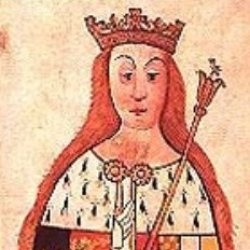
Anne Neville ADD DETAILS
ADDITIONAL NOTES:
Cecily's sons:
Edward IV (died age 40, cause of death widely speculated but unknown);
Edmund, Earl of Rutland (died age 17 circa Battle of Wakefield);
George Plantagenet, Duke of Clarence (executed age 28 upon the order of the king, his brother Edward);
Richard III (died age 32 at the Battle of Bosworth Field).
0 notes
Text

Isabel le Despenser, Countess of Worcester and Warwick, LG (26 July 1400 – 27 December 1439) was the posthumous daughter and eventually the sole heiress of Thomas le Despenser, 1st Earl of Gloucester by his wife, Constance of York, daughter of Edmund of Langley (son of King Edward III of England). She was born six months after her father had been beheaded for plotting against King Henry IV of England (1399–1413).
0 notes
Photo

Born at Rouen, France, on April 28, 1442, Edward IV, was King of England from March 4, 1461, to October 3, 1470; and again from April 11, 1471, until his death.
The first King of England from the House of York, Edward’s rule was marred by the violence of the Wars of the Roses (an internecine conflict between two enormously powerful branches of the Royal House of Plantagenet: the House of York; and their rivals to the English throne, the House of Lancaster).
Edward overcame the Lancastrian challenge to the throne at a decisive battle at Tewkesbury in 1471; reigning thereafter in peace until his death.
*
Edward’s father, Richard, 3rd Duke of York (of the House of York), had been heir to King Henry VI (of the House of Lancaster). As the conflict intensified, the Duke established a dominant position after his victory over the Lancastrians at the First Battle of St Albans in 1455, in which his chief rival, Edmund Beaufort, Duke of Somerset, was killed.
The conflict still escalating, Henry’s Queen, Margaret of Anjou, rebuilt a powerful force and moved against the Duke of York in 1450. Whereupon the Duke initially fled to Ireland and was eventually killed at the Battle of Wakefield; though by that time, Parliament had issued an Act of Accord declaring him to be legitimate heir to the throne. As such, Edward (Head of the House of York following his father’s death), had a legitimate claim to the English throne and was eventually proclaimed King with the assistance of his chief supporter, Richard Neville, 16th Earl of Warwick (Warwick the King Maker); Edward, thereafter advancing against the Lancastrians in the exceptionally bloody Battle of Towton on March 29, 1461.
His health failing, Edward became fatally ill at Easter 1483, and died on April 9, 1483. He was succeeded by his twelve-year-old son, Edward V (who was never crowned), and then by his brother, Richard III (Edward V and his younger brother, Richard of Shrewsbury, being the Princes in the Tower who disappeared after being sent to heavily guarded royal lodgings in the Tower of London; Richard III, widely believed to have been responsible for their deaths).
Edward IV Rests in St George’s Chapel, Windsor Castle.
1 note
·
View note